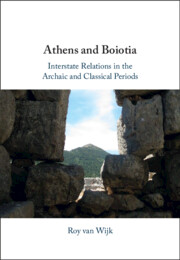Acknowledgements
First, I would like to thank the University of Fribourg for providing a space and a stimulating environment to conduct my research. Another token of gratitude is extended to the Swiss National Science Foundation, who generously sponsored my PhD and its open-access publication and allowed me to pursue academic life to the fullest extent, such as travels to Greece and Oxford and participation in various courses. Presentations in the Netherlands, Italy, Switzerland, France, the United Kingdom and Canada further helped my insights through the critical engagement of the audiences there. These years laid the basis for this book, which was refined during my time at the Radboud University of Nijmegen, Utrecht University in the Netherlands and the University of Münster. The latter position is supported by the SNFS Postdoc Mobility Fellowship and Hans Beck’s kind backing.
A special word of thanks is due to my supervisor Fabienne Marchand. She was instrumental in my integration at the university and my life in Switzerland. Her kind, encouraging words, sharp criticism, empathic understanding of the difficulties of moving to a new country and extraordinary patience have not only made this book much better but also improved me as a person, not just as researcher.
Throughout my travels I have benefitted from the pleasant company of many others. One of these companions was Professor John Bintliff, with his dry sense of humour and unsurpassed knowledge of Boiotia’s landscape. Samuel Gartland was a willing listener and friendly host at the University of Oxford. A warm word of gratitude goes out to Professor Albert Schachter, an inspirational scholar and an extremely pleasant person to be around. The epigraphic workshops at Oxford were a mainstay in my calendar, but the weekly lunches with Albert afterwards made me look forward to them even more. His willingness to share his thoughts on numerous occasions, as well as read some of my written work, has saved me from many errors. Sylvian Fachard discussed the borders of Attica and Boiotia with me and shared useful information with me prior to publication. I am indebted to him for allowing me to reproduce some of his maps that were of instrumental value, as well as his invaluable comments on Chapter 4, especially on the Mazi and Skourta plains. I am also grateful to Jessica Paga, who shared some of her work prior to publication. The same goes for Josiah Ober, who gracefully let me read parts of his work on Greeks and the Rational. Gil Renberg was courteous enough to share his article in ZPE with me. Lynette Mitchell shared her paper on Tanagra and Plataia with me before publication. Salvatore Tufano has been a supportive companion in Boiotian studies throughout. Nikolaos Papazarkadas’ insightful comments have improved this book, and he has been supportive throughout the process of finalising it. Hans Beck has been a constant help and has provided guidance throughout the odyssey that is writing and academics. Professor Denis Knoepfler was equally helpful with comments and remarks during the writing of this book.
I would like to thank the following people for their help in various forms: Eran Almagor, Nathan Badoud, Hans Beck, Josine Blok, Amber Brüsewitz, Nick den Boer, Peter Funke, Chandra Giroux, Simon Glenn, Paul Grigsby, Olivier Hekster, Marian Helm, Pieter Houten, Yannis Kalliontzis, Rutger Kramer, Mounir Lahcen, Stephen Lambert, Peter Londey, Thierry Lucas, Angelos P. Matthaiou, Alex McAuley, Marco Tentori Montalto, Aydin Mutlu, Ruben Post, Margit Pothoven, Giorgia Proietti, Peter Rhodes, Ortal-Paz Saar, Rolf Strootman, Aldric Tchesnakoff, Thijs Toebak, Winfred van der Put, Roland van Lienden, Charlotte van Regensmortel, Frank van Wijk, Marco Vespa and Zhong-da Yin.
For permissions to reproduce images, I would like to thank Pascal Arnaud, Sylvian Fachard, Alex Knodell, Despoina Papageorgiou and Thomas Tartaron.
Similarly, the editorial process was not a solo pursuit, and the help and support I received from Michael Sharp, Christian Green, and Katie Idle at Cambridge University Press were instrumental in seeing the project through. The anonymous peer reviewers equally provided invaluable insights that significantly improved the book. Hemaltaha Subramanian at Straive and copy-editor Stephanie Sakson ran a smooth editing process which greatly helped the monograph along.
On a more personal note I would like to thank my family for supporting me both in the Netherlands and abroad to pursue a PhD. The choice of ancient history must have been an incomprehensible one at times, but there is the hope that this book fulfils a promise made long ago, although I am sure that both myself and the person I promised it to never could have imagined the extent of that commitment.
Finally, I want to thank my family, which witnessed some expansion during the finalisation of this book. Juno’s love and enthusiasm for walks made sure that I went outside sometimes. Freddy’s ever-present smile surely made it easier to let off stress when that was very much needed. Hopefully he will appreciate my work nonetheless. Most of all I want to thank Laura, mo leannan bhoidheach. Her love and caring throughout the PhD and the reworking of it into a monograph surpass any other form of support one could possibly hope for. Without her, I could not have finished this task, let alone settle in Switzerland. Therefore, I hope this book can at least serve as an appreciation of all the sacrifices she has made on my behalf.



